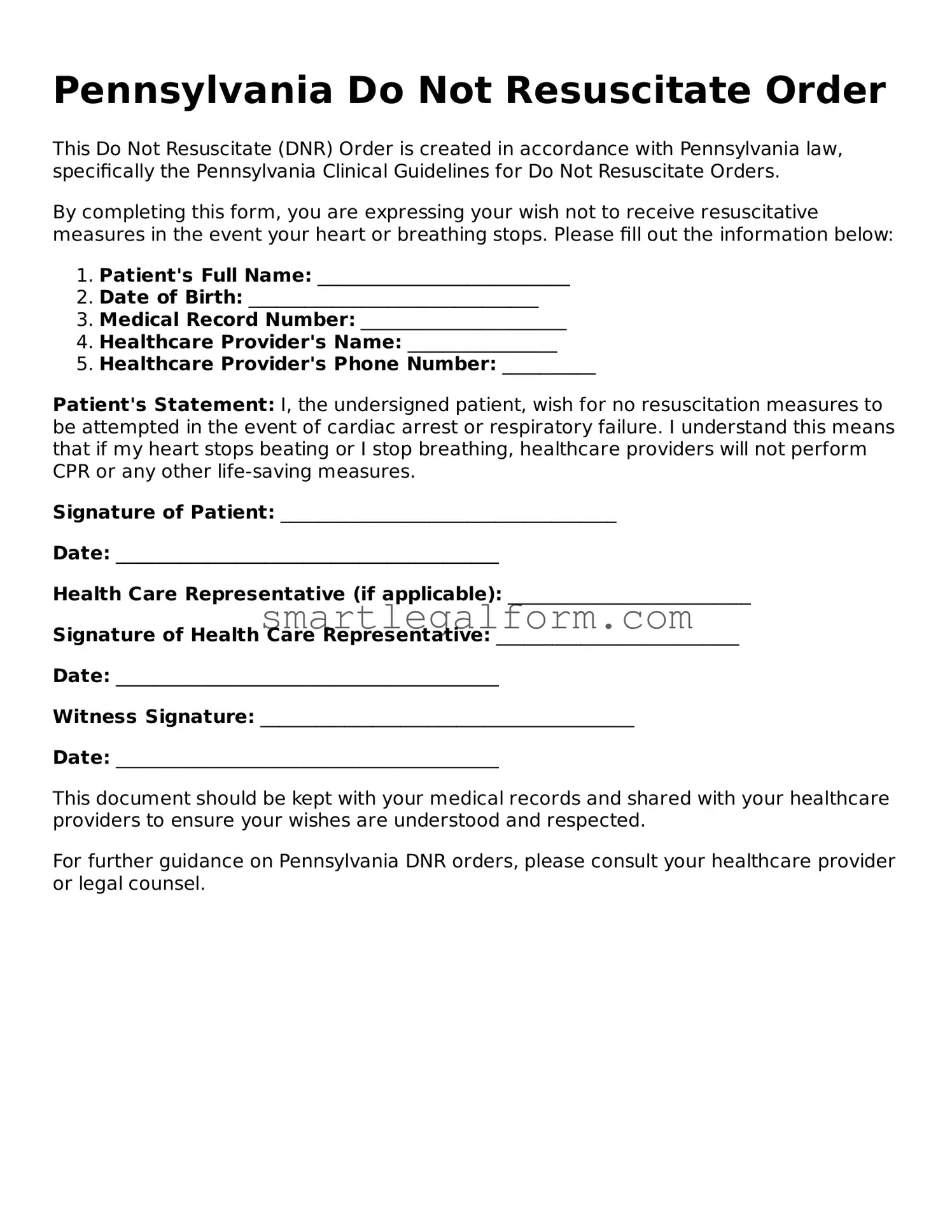Printable Pennsylvania Do Not Resuscitate Order Document
Form Preview Example
Pennsylvania Do Not Resuscitate Order
This Do Not Resuscitate (DNR) Order is created in accordance with Pennsylvania law, specifically the Pennsylvania Clinical Guidelines for Do Not Resuscitate Orders.
By completing this form, you are expressing your wish not to receive resuscitative measures in the event your heart or breathing stops. Please fill out the information below:
- Patient's Full Name: ___________________________
- Date of Birth: _______________________________
- Medical Record Number: ______________________
- Healthcare Provider's Name: ________________
- Healthcare Provider's Phone Number: __________
Patient's Statement: I, the undersigned patient, wish for no resuscitation measures to be attempted in the event of cardiac arrest or respiratory failure. I understand this means that if my heart stops beating or I stop breathing, healthcare providers will not perform CPR or any other life-saving measures.
Signature of Patient: ____________________________________
Date: _________________________________________
Health Care Representative (if applicable): __________________________
Signature of Health Care Representative: __________________________
Date: _________________________________________
Witness Signature: ________________________________________
Date: _________________________________________
This document should be kept with your medical records and shared with your healthcare providers to ensure your wishes are understood and respected.
For further guidance on Pennsylvania DNR orders, please consult your healthcare provider or legal counsel.
Common mistakes
Filling out a Pennsylvania Do Not Resuscitate Order (DNR) form is an important step for those who wish to express their medical preferences. However, mistakes can happen. One common error is failing to provide complete personal information. It's crucial to include your full name, date of birth, and any other identifying details. Missing this information can lead to confusion and may delay the implementation of your wishes.
Another mistake is not having the form signed by the required parties. In Pennsylvania, the DNR form must be signed by the patient or their legal representative. Additionally, a witness signature is often needed. Without these signatures, the form may not be valid, which could result in unwanted medical interventions.
People sometimes overlook the importance of discussing their wishes with family members and healthcare providers. This conversation can help ensure that everyone understands the patient's preferences. If family members are unaware of the DNR order, they may feel compelled to intervene during a medical crisis, going against the patient’s wishes.
Additionally, individuals may forget to keep copies of the DNR order in accessible places. It's essential to have copies on hand and to share them with healthcare providers. If the form is not readily available when needed, it may not be honored, leading to unwanted resuscitation efforts.
Another common mistake is not reviewing the DNR form periodically. Life circumstances can change, and so can medical preferences. Regularly checking the form ensures that it still reflects the patient's current wishes. If changes are needed, they should be made promptly and documented properly.
Lastly, some individuals fail to understand the implications of a DNR order. It's vital to know that a DNR does not mean no medical care. Patients will still receive comfort care and treatment for other medical issues. Clarifying this distinction can help alleviate concerns and ensure that the DNR order aligns with the patient’s overall healthcare goals.
Dos and Don'ts
When filling out the Pennsylvania Do Not Resuscitate (DNR) Order form, it is crucial to follow specific guidelines to ensure that your wishes are accurately documented and respected. Below is a list of what you should and shouldn't do.
- Do consult with your healthcare provider before completing the form.
- Do ensure that you fully understand the implications of a DNR order.
- Do have the form signed by a physician to make it valid.
- Do keep copies of the signed DNR order in accessible locations.
- Don't fill out the form without discussing it with family members.
- Don't assume that verbal agreements are sufficient; written documentation is necessary.
- Don't forget to review and update the DNR order as your health situation changes.
Other Do Not Resuscitate Order State Forms
Texas Dnr Form - A DNR form does not mean that all care will stop; comfort measures will still be provided.
Understanding the implications of granting authority through the Florida Power of Attorney for a Child form is crucial for any parent or guardian looking to ensure their child’s best interests are safeguarded. It is important to know whom you are designating and the responsibilities they will assume in your absence. For more detailed information on the process and its significance, you can read here.
How to Get Dnr - Medical professionals are trained to handle DNR situations with sensitivity and care.
Similar forms
- Advance Healthcare Directive: This document outlines a person's preferences for medical treatment in case they become unable to communicate their wishes. It can include instructions for life-sustaining treatments, similar to a DNR order.
- Living Will: A living will specifies what types of medical care a person wants or does not want at the end of life. Like a DNR, it guides healthcare providers in making decisions that align with the patient's wishes.
- Power of Attorney for Healthcare: This document designates an individual to make healthcare decisions on someone else's behalf. It can support a DNR order by ensuring that the appointed person understands and respects the patient's wishes.
-
Durable Power of Attorney: A durable power of attorney form is essential for appointing someone to manage your financial and legal affairs, particularly in scenarios where you are unable to make decisions yourself. For more information, visit https://toptemplates.info.
- POLST (Physician Orders for Life-Sustaining Treatment): This is a medical order that outlines a patient's preferences for treatment in emergencies. It is similar to a DNR in that it provides clear instructions to healthcare professionals about the patient's desires.
- Do Not Intubate (DNI) Order: A DNI order specifically instructs healthcare providers not to place a patient on a ventilator. It is often used alongside a DNR order to clarify the extent of medical interventions a patient wishes to avoid.
